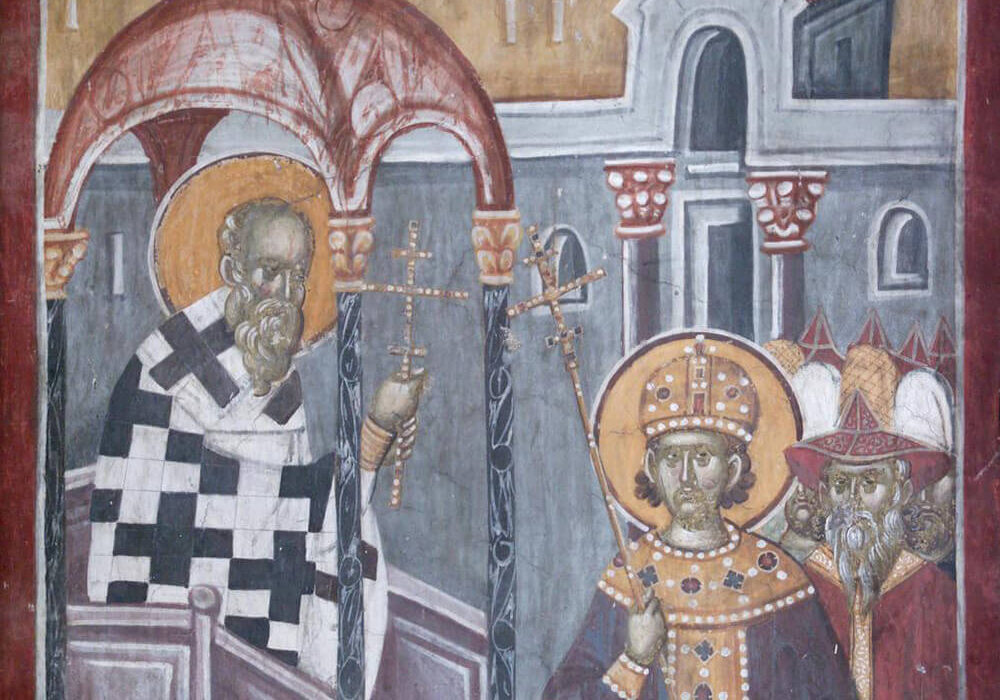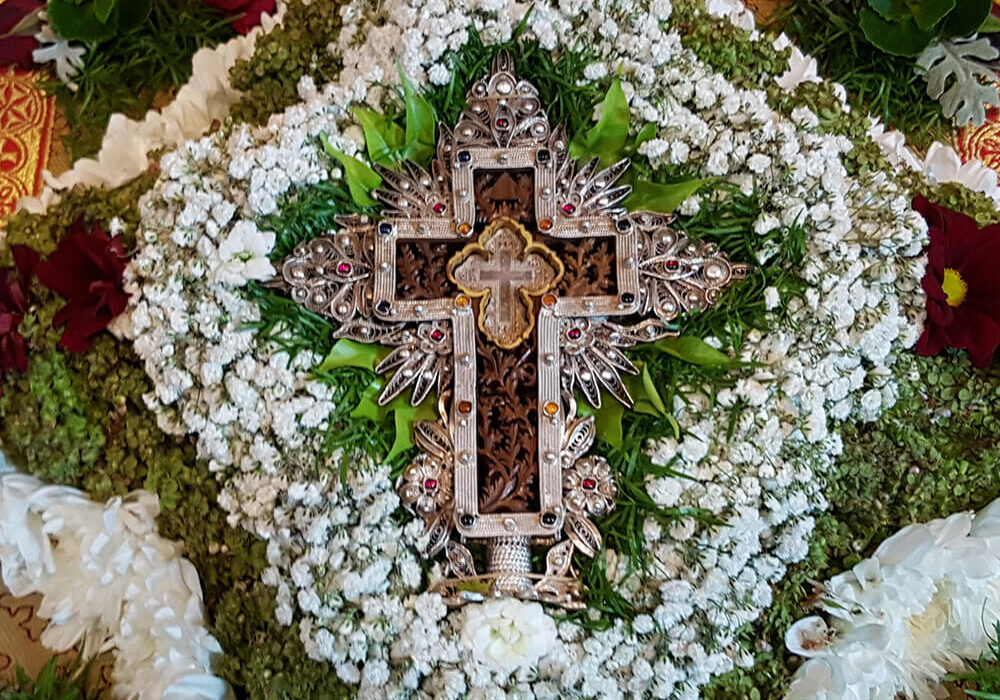
The great feast of the Exaltation of the Precious Cross does not directly pertain to the Lord’s life, but rather to the extension of His life in the world and in the Church. Today’s event was established as an ecclesial feast when, after the Cross had been stolen by the Persians, the Byzantine emperor Heraclius managed to bring it back to Jerusalem in 629. When he returned it, the bishop of Jerusalem joyfully raised it up and blessed the people with it. And this event was repeated in history because there were other troubles surrounding the wood of the Holy Cross.
As an aside: The wood of the Holy Cross continually works miracles, as happened during the reign of Holy Empress Helen, when three crosses, those of the Lord and of the two thieves, were found buried deep in the earth. Not knowing which one was the Lord’s, they found out by touching a possessed woman to each one and, evidently, the demon fled when it felt the power of the Holy Cross. There is nothing holier than the Lord’s Cross, because it was sanctified with His Blood, and one drop of the Lord’s Blood is more precious than the entire world.
The wood of the Holy Cross is the holiest, hence why it always works miracles. We have a contemporary witness from Abbess Makrina Vassopoulos, who was a saintly figure of our times, a great ascetic, and a spiritual mother to several monasteries here in America. When she had cancer in 1988, she went to a priest who had a small relic of the wood of the Holy Cross, and when he brought her the relic, it was attracted like a magnet to the cancer. And he said the same thing happened for others who came with various ailments. Thus, the wood of the Holy Cross always works miracles because it is so holy, it is full of grace. It is the altar on which the Lord offered Himself, the altar which He thoroughly sanctified.
But the Cross is also a meeting place. Here, man meets God and God meets man, because Christ the God-Man was crucified on it. Saint Maximus the Confessor says that the Lord would have become incarnate anyways, even if Adam had not fallen, in order to deify man. Only that, had the fall not occurred, the incarnation would not have culminated in bloodshed. After the fall, the Lord’s incarnation and the salvation which He brought, as He is the salvation of God (cf. Isaiah 49:6), embraced the Cross: the bloodiest and harshest form possible. In this way, the Cross became a meeting place between God and man. There is no other. If man wants to meet God, he will meet Him on his cross. The cross cannot be avoided. Saint Isaac the Syrian says that just as an infant cries and wails when it is born because it comes into contact with the air, with this world – it’s an instant reaction –, we experience something similar when we come into contact with the other world via the cross. Through the cross, we breathe in eternal life, but the first breaths are painful. We dislike the cross, we flee from it instinctively, but we need to educate and strengthen ourselves so that we no longer flee from it, because we cannot avoid the cross if we want to meet God.

The cross was a curse, it was something abominable, terrible, unclean, full of blood. But for this very reason can I approach it, because I too, through my falls, have become like this (a curse, abominable, terrible, unclean). As I am, an unclean sinner, I cannot approach God. But I can approach His cross, because it is also unclean (of course, it is simultaneously the most holy thing in the universe, being sanctified by the Savior’s blood and oblation). Just as the harlot could not approach the Lord, but she could approach His (dusty, dirty) feet. Therefore, anyone can approach the Lord’s Cross. We all meet here: sinners and saints, God and men. We, sinners, find ourselves here to be cleansed of our many sins, while the saints so that they might follow the Lord “unto the end”, bearing a cross that is much greater and heavier than ours. Everyone meets at the cross, it’s a meeting place.
We might also say that a person is as valuable as the cross he or she bears. The cross means suffering, needs, and misfortunes. Through our cross, we become true, serious, full. Through it, we shed all unnecessary things and become essential. In this way, we can speak with God “face to face” (cf. Exodus 33:11). Suffering makes us very collected and, unfortunately, we cannot gather ourselves otherwise. And it is the measure of our value. It shows us how serious we’ve become in our life and it confers on us glory in the next life. That glory is destined for all, but not everyone can bear it, because not everyone can bear a cross that corresponds to that glory. I say this to highlight an exhortation that Abbess Makrina addressed to her nuns: to contemplate Christ, to contemplate how He climbs Golgotha. We also ought to live our life acquiring grace from the Liturgy and from everything we do and to gather it in our heart, so that we can endure our own Golgotha, on our cross. And it’s possible, all the saints prove it. No matter how weak we might be, even more so in our times, by God’s grace we can strengthen ourselves so that we don’t become deserters, so that we don’t flee from Him and so that we remain on our cross. May God help us and may He continually grant us this hope that He is with us and will strengthen us. Amen.
